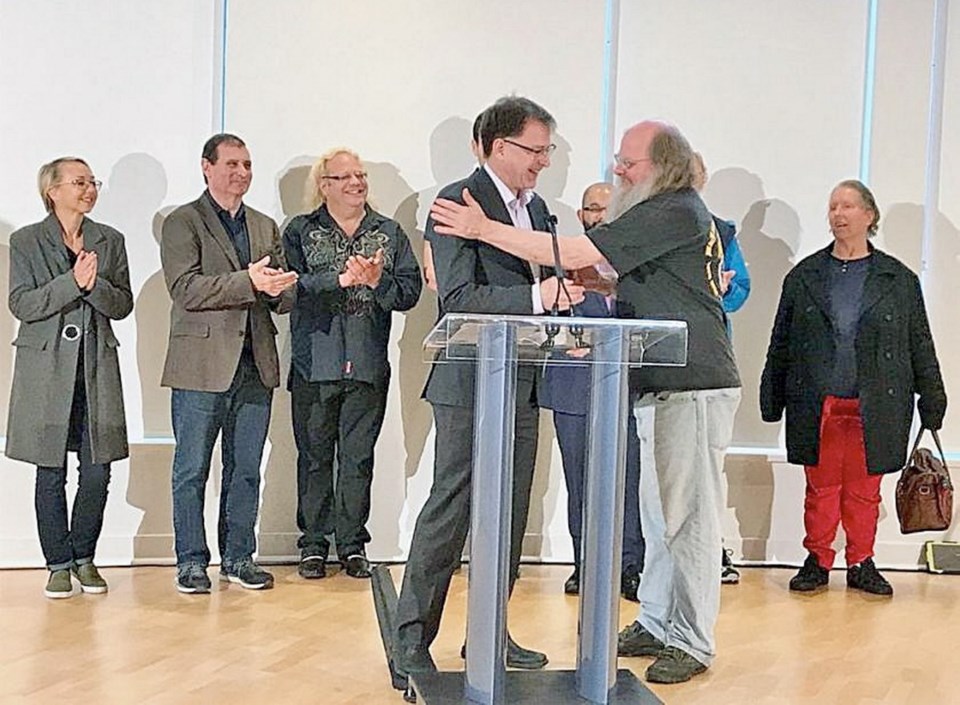VANCOUVER — Survivors excluded from a previous Woodlands settlement have finally started receiving their compensation payments for years of systemic abuse at the B.C. institution.
Individuals who lived at Woodlands before 1974 will now receive $10,000 in ex gratia payments, which means they are voluntarily paid out without admission of liability. Those who lived at Woodlands post-1974 and who received compensation as part of a 2010 settlement will also receive a top-up to a maximum of $10,000.
Bill McArthur, a former Woodlands resident and survivors’ advocate, received his payment on Monday from Minister of Health Adrian Dix.
“It’s been a bittersweet victory in that I’m very happy I was able to gain compensation for all the people who weren’t able to get it and to represent all those who have no voice,” said McArthur, who was sent to Woodlands at age five.
“But it’s been bittersweet in that I regret there are so many who have passed away in this long crusade for justice.”
McArthur said he was happy about Monday’s milestone but said “it should not have had to take so long.” The B.C. government announced in March that it would be paying out compensation to those excluded by the 2010 settlement.
“I think it’s very important to acknowledge that a wrong was done,” McArthur said. “That there was wrongdoing against some of the most vulnerable people in our society.
“I think it’s very important … to give these people back some sense of dignity and self-respect and recognition.”
As of Monday, a total of 314 pre-1974 Woodlands survivors had been identified and contacted by officials. Dix estimated that there are up to 1,500 survivors who have yet to be compensated, and he invited those people to come forward.
The government estimates the compensation would total between $9 million and $15 million and expects payments to be complete by April 2019.
New Westminster’s Woodlands Institution was opened in 1878 and housed individuals with developmental disabilities and mental illness. It was first known as the Provincial Asylum for the Insane and had multiple name changes before finally becoming Woodlands in 1974. The facility was run by the Ministry of Health before being handed over to the Ministry of Human Resources in 1974.
The facility was closed in 1996.
A 2002 report commissioned by the provincial government found that there had been widespread sexual, physical and psychological abuse of Woodlands’ residents for years. Former residents told of extreme isolation, beatings, cold and scalding showers, and rape. Kids were lined up naked to use the washroom and others were dragged by their hair.
The ensuing government refusal to accept the report prompted a class-action suit in 2002. It was settled in 2010 and compensation was paid out to residents who lived at Woodlands, but only those who did so after Aug. 1, 1974.
The B.C. government imposed the 1974 cutoff because that was when the law permitting people to sue government for wrongdoing came into effect. As many as 500 former patients were left empty-handed, with advocates calling the arbitrary date morally and ethically wrong even if legal.
Dix first met with pre-1974 Woodlands survivors and advocates, including McArthur, in 2005.
On Monday, he said one of the most striking memories from having worked on the Woodlands file for so long is recalling the faces at that 2005 meeting who have since passed on, such as Len Zimmer, and are unable to see Monday’s milestone development.
“I looked around that table, at the people who were there that day … and saw how important it was to them, how eloquent they were and thoughtful they were and caring they were and how much this had affected them,” Dix recalled.
“I think of the people who didn’t live to get justice and then those who did.”
Both McArthur and Dix shared the sentiment that while this chapter in B.C.’s history was a dark and painful one, it would also serve as a lesson and reminder for future generations of British Columbians to treat those with developmental disabilities with compassion and kindness.



